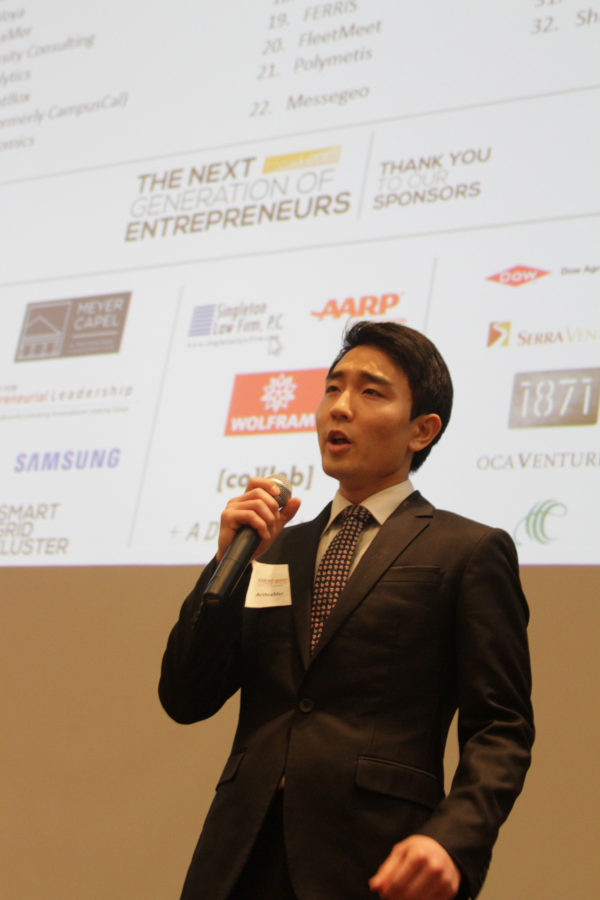Cozad Competition opens entrepreneurial world for all who compete
Jan 31, 2016
For innovators and entrepreneurs, Cozad is the largest event of its kind on the University campus. Hosted by the Technology Entrepreneur Center, the event brings students and faculty from different disciplines together to present their most innovate ideas for a judging panel.
This year, corporate sponsors such as Motorola Solutions, State Farm and AARP Foundation will award prizes in specific areas of innovation.
“Entrepreneurship is so popular right now, and I think even if you don’t necessarily have the next huge idea, I think it’s great to do Cozad because you’re going to learn so much,” said Ashley Hipsher, marketing coordinator for Technology Entrepreneur Center. “Even if you know in the future this isn’t going to go anywhere, or ‘I’m not going to necessarily start my own business and be the next Mark Zuckerberg,’ you still are gaining the skills that you need in any aspect of life.”
The competition starts with the intent to compete form, due this Sunday, Feb. 7.
Get The Daily Illini in your inbox!
To ensure fairness, there are two tracks in Cozad: University-funded and non-University funded. According to Hipsher, the non-University funded track is usually composed of students who are working on the idea as a hobby, while the University-funded track is typically for students who will use University labs, equipment and resources.
Elevator Pitches are next, on February 23 and 25, where about 50 entrepreneurs pitch their ideas each night to the public, totaling about 100 students. After the pitches, the teams are cut down to 50, and an online business model proposal narrows down up to 20 teams who will then compete at the final showcase in April.
For Thomas Reese, University alumnus and 2015 winner of the non-University funded track, Cozad presented an opportunity to pitch FlipWord, software that allows users to passively learn a language while browsing the web.
It was during his first semester at the University as a graduate student in Computer Science that Reese thought of his idea. He was previously studying abroad in Hong Kong and independently learning Mandarin Chinese. He found that even if he was super motivated to learn the language, he would forget to study it.
Reese enlisted others to work on a prototype for FlipWord and develop the idea more at HackIllinois in April 2014.
“It was a small interest of mine at that point, and I still didn’t think it would be that great,” Reese said. “I just thought it would be a good idea for a quick prototype. When we first made it, it was really slow, it was really buggy, it was really awful and you weren’t going to learn anything with it. It wasn’t ready.”
About a year later, a small interest turned into a serious endeavor, and Reese started working on the program approximately four hours every day for three months, totaling about 300 to 400 hours leading up to the competition.
Though he went on to win $15,000 in seed funding at the competition, Reese took away more than a monetary prize.
“The biggest thing you’re going to take away from it is something you didn’t know you were missing,” he said.
Aadeel Akhtar, M.D./Ph.D. candidate in Neuroscience at the University and 2015 Cozad Competition winner of the University-funded track, said competing with other entrepreneurs added to the experience.
“There are really, really great ideas, especially ones that are going to help a lot of people that are coming out of the University, and to be just one of them was a really incredible experience,” Akhtar said.
Though some students may fear presenting their ideas in front of a panel of judges, Stephanie Larson, assistant director of student programs and marketing for the Technology Entrepreneur Center, said students shouldn’t be afraid to share their ventures.
“The worst thing that can happen is you pitch your idea, and you get some feedback that is real feedback that can help you,” Larson said. “From what I’ve seen doing this for the past seven years, the feedback you get is what can help you to become great.”
Reese said letting people use his program and seeing other’s excitement over it helped him improve and develop FlipWord more.
“Do it even if you don’t have an idea and even if you don’t know why you’re doing it. Don’t be afraid or be nervous, just get up there and try,” he said. “You have to try. The amount that you stand to gain is far more than you have to lose.”






